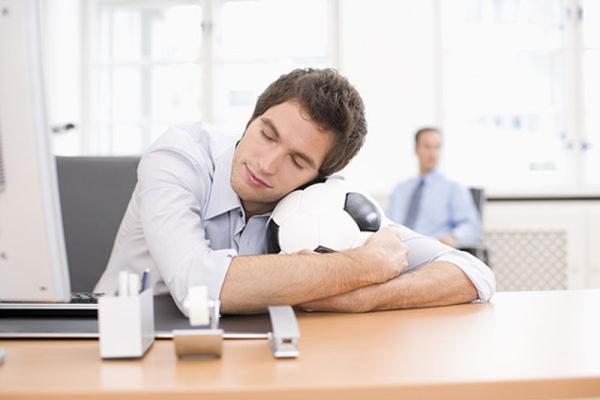(单词翻译:单击)
If you find yourself hitting the snooze button every morning, don't blame yourself.Your work schedule could be to blame.
如果你发现自己每天早上都打盹儿,那么别怪自己。你的工作时间才是应该责难的。
A growing field of research now shows that, for many of us, our work schedules are wildly out of sync with our natural body clocks — and experts are urging employers to take notice.
如今,越来越多领域的研究显示,我们的工作时间和我们的自然生物钟极不同步,专家敦促雇主应该注意这一问题。
Sleep is a "strategic resource" that most companies are ignoring, according to a white paper by Christopher Barnes, a management professor at the University of Washington's Foster School of Business in the US.
美国华盛顿大学商学院管理学教授克里斯托弗·巴恩斯的白皮书指出,睡眠是大多数公司正在忽略的一种"战略性资源"。

When work schedules are aligned with people's natural sleep patterns, they produce higher quality and more innovative work because they are more focused, less stressed and generally healthier, he wrote. The opposite is also true – when employees are sleep deprived they are more likely to make major mistakes and suffer from workplace injuries. His research has even shown that night owls behave more unethically in the morning than at night and that early birds were more unethical at night.
在书中他这样写道:通常情况下,当工作时间和人体的自然睡眠模式一致时,人们可以更高效、更富有创造性的工作,因为这时的人们更专注,压力更小,健康状态更好。而它的反面也是毋庸置疑的--当员工被剥夺了睡眠时间时,他们更易犯错,遭受工伤。他的研究甚至表明,夜猫子白天的表现比晚上更不符合职业规范,早起鸟反之亦然。
But it's not just about the amount of sleep you get. Whether you can be productive at 8 am depends on circadian rhythm. Every organism from primitive bacteria to human beings have a biologically determined, internal body clock, said Till Roenneberg, a professor of chronobiology at the Institute of Medical Psychology at Ludwig-Maximilian University in Munich. And that clock can vary greatly depending the person.
但这并不仅仅和睡眠多少有关。你是否在八点高效,取决于你的生理规律。德国慕尼黑大学医学心理学研究所时间生物学教授提尔·罗内伯格表示,从原始细菌到人类,每个生物体都有一个生物因素决定的内在生物钟。根据个体的不同,生物钟也多种多样。
"It's like feet," said Roenneberg. "Some people are born with big feet and some with small feet, but most people are somewhere in the middle."
罗内伯格教授说:"生物钟就像脚一样。一些人生来脚大,一些人生来脚小,大部分人不大不小。"
According to Roenneberg the problem is that our lives typically don't take into account circadian rhythms as they might have when we spent more time outdoors in natural light. Many companies start the work day at 8 am or 9 am, putting their work schedules at odds with their employees' body clock. That mismatch, along with the pressure to be productive and be available to respond to email or take calls at all hours of the day and night, mean that many people suffer from what he calls "social jetlag". In other words, their bodies are always in the wrong time zone.
据罗内伯格所说,问题的关键在于:通常情况下,当我们在户外自然光中度过大部分时间时,我们的生活并不顾及我们的生物节律。许多公司从早上八点或者九点开始办公,这和员工的生物钟不一致。这种不匹配,伴随着日夜可回复电邮和接通电话的工作压力,意味着许多人因此而饱受"社会时差"的折磨。换句话说,他们的身体总是在错误的时区里。
He estimates that more than 70% of people get up earlier than they should .
罗内伯格估算了一下,70%多的人起得比他们应该起床的时间早。


